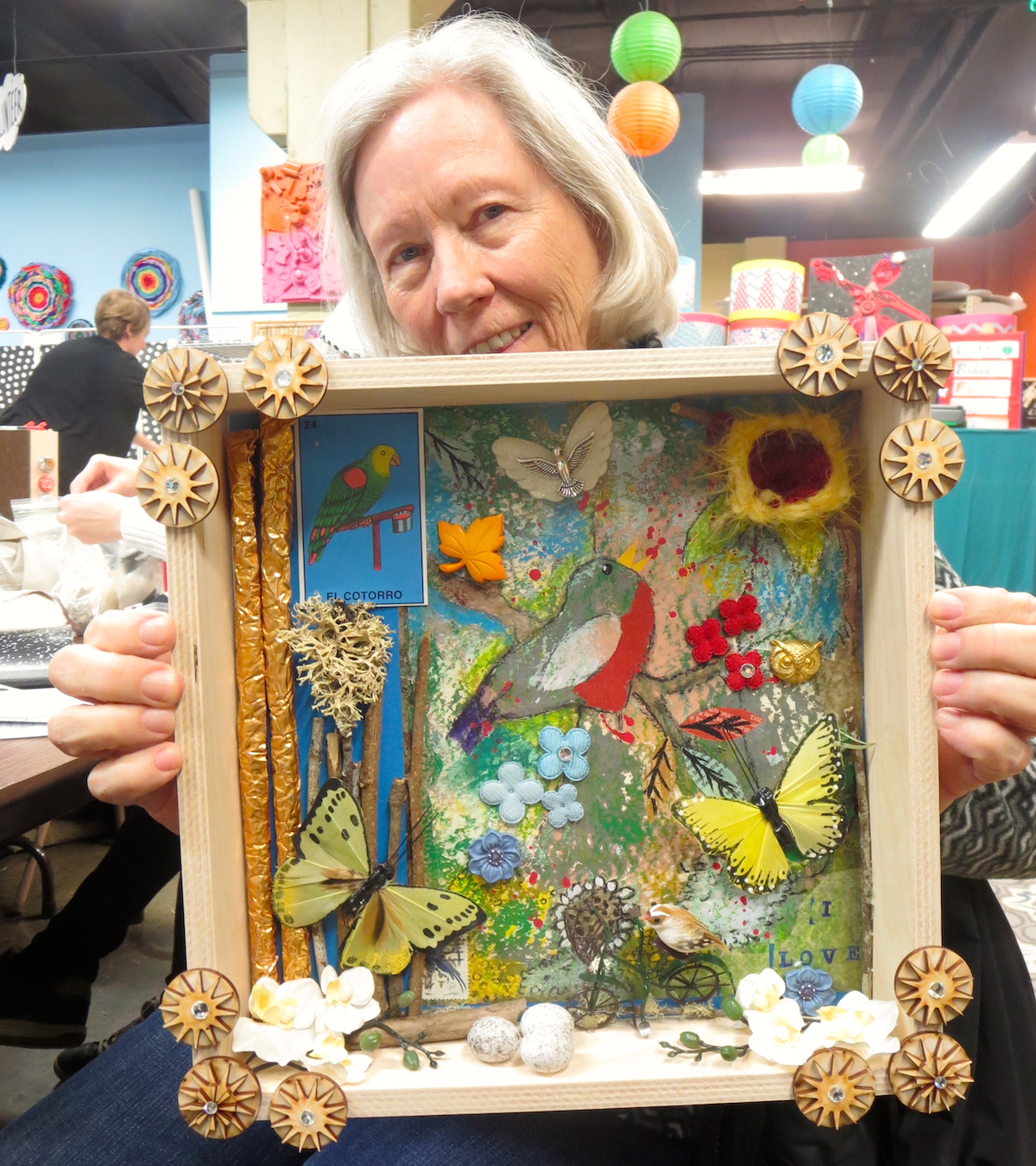Sandy carefully glues a picture postcard of a parrot into her shadow box.
“My vision for this assemblage is to honor my love for birds, may their humor and beauty be protected forever,” she wrote in her artist’s mission statement.
Johnnie lovingly points out the tiny gumball machine, the miniature Victrola and a row of toy plastic cows strolling across the bottom of his box. His theme is an homage to his childhood and a long-ago way of life.
The small ring of keys placed thoughtfully in a corner of Aileen’s creation is intended “to symbolize the keys to the houses I have had, left, and those I’ve wanted,” she said.
Six participants with mental health issues such as post-traumatic stress disorder, schizophrenia, psychoses, bipolar disorder and depression met once a week in March to create art together in a back classroom of Scrap, a nonprofit that encourages creative reuse of materials through arts and crafts. The project was sponsored by The Giving Tree Northwest and funded by Portland’s Regional Arts and Culture Council’s Arts Equity Grant.
Street Roots vendor Lori Lematta co-facilitated the workshop, along with Heather Morrill. Lematta, a visual artist, is the founder of the Art as Therapy group for people fresh to addiction recovery at the Richard Harris Building, a downtown apartment building managed by Central City Concern.
The finished assemblages will be featured in a gallery exhibit called “Bloom” from 6 to 8 p.m. on First Thursday, May 3, at the J. Pepin Art Gallery, 319 NW Ninth Ave. The exhibition will kick off May’s commemoration of Mental Health Awareness Month.
Lematta passionately believes the large population of people in mental health and addition recovery should have the same opportunities for art classes and workshops readily available to those with resources. Historically, people experiencing poverty, homelessness, and mental health and addiction challenges have had little or no access to community art workshops. Lematta would like to change that.
Lematta has experienced firsthand how creative expression in a safe community environment can significantly affect recovery.
“I believe doing art together brings people out of their ruminating mind and into new insights about themselves, feeling a sense of relief and ways to deal better in the world,” Lematta said.
To back up her beliefs with action, Lematta became a state-certified peer support specialist in 2014. She described the program as “a partnership between two people of similar backgrounds, (such as mental health and addiction recovery), who support and challenge each other.”
Following her certification, Lematta facilitated visual art and journaling workshops at Central City Concern, Old Town Clinic and Rose Haven Day Center for Women and Children. She has also volunteered at p:ear to support homeless youths and has been an instructor for The Giving Tree, a nonprofit that uses art and other services for invisible and underserved populations to “reduce isolation, increase personal resilience, and foster healthy communities.”
Co-facilitator Morrill, former program development coordinator for The Giving Tree, has been working for the past seven years to bring creative outlets to residents in affordable housing. She decided to design a workshop and pursue funding specifically for people facing mental health challenges after a Giving Tree survey circulated at the end of last year revealed a need.
“Of the 70 survey respondents at one affordable-housing site, 54 percent self-report a diagnosis of mental illness, 50 percent expressed interest in ‘art opportunities,’ and 31 percent were both living with a diagnosis and interested in art opportunities with The Giving Tree,” Morrill said.
“Heather’s work with The Giving Tree was the seed of my realization that mental health is profoundly improved by art, especially in an environment of support and community,” Lematta said.
Lematta said her No. 1 indicator of a workshop’s success is the feedback from the participants. At the end of the March workshop, artists had positive reactions:
“Sharing this space and creative time with like-minded artists has truly been a gift.”
“I am constantly inspired by my surroundings here.”
“When I am unwell I am scattered and fragmented, when I am well I am peaceful. It has been a calming experience to create this piece.”
“I am looking at things differently because of this process and seeing more possibilities.”
“The reason I do this work is basically because if I don’t, then who will?” Lematta said. “Classes such as these build confidence and socialization in an emotionally safe and stigma-free environment. I have my own challenges with diagnosed bipolar and PTSD. I have daily struggles with many issues. That is why Street Roots has been my lifesaver for the last four years. I have to work when I can work and just do the very best I can.”
Lori sells Street Roots on Sundays at Westminster Presbyterian Church, 1624 NE Hancock St.
You can visit the artists of the Bloom workshop at the May 3 exhibition as they celebrate their work and fight the stigma of mental illness.
Street Roots is an award-winning, nonprofit, weekly newspaper focusing on economic, environmental and social justice issues. Our newspaper is sold in Portland, Oregon, by people experiencing homelessness and/or extreme poverty as means of earning an income with dignity. Learn more about Street Roots

